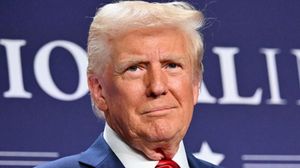Wall Street started the week with significant declines, fueled by the prospect of heightened trade tensions following the announcement of new tariffs by President Donald Trump. At the opening of the New York Stock Exchange, the Dow Jones Industrial Average saw its points drop by over 600 before stabilizing slightly, closing with losses of 62 points, or 0.14%, at 43,982.84. Similarly, the broader Standard & Poor's 500 index fell by 0.58%, and the tech-heavy Nasdaq Composite was down 1.07%. This trend reflects the anxiety gripping investors as they react to potential repercussions of the tariffs, which are set to affect more than 40% of US imports, amounting to approximately 1,300 billion dollars.
The immediate market impact unfolded on Monday as the news of tariffs of 25% on goods from Canada and Mexico and 10% on Chinese imports sent shockwaves through financial markets worldwide. During initial trading, the Dow Jones plummeted by as much as 561.82 points, representing a 1.26% decrease, and the S&P 500 dropped by 1.69% with forecasts indicating possible recessionary effects. George Sarevlos, head of currency research at Deutsche Bank, warned, "We foresee immediate recessionary consequences for some of the affected economies and significant negative impacts on the global economy."
Notably, the automotive sector was among the hardest hit. Stocks for major car manufacturers such as Tesla, Ford, and General Motors saw declines of 5%, 3.7%, and 5.7%, respectively. The tariffs are especially concerning for this industry, which heavily relies on cross-border trade. Stocks tied to semiconductor manufacturers also faced losses, with leading companies like TSMC and Micron Technology down between 2.8% and 5.3%. Large-cap companies such as Alphabet and Amazon recorded modest losses, reflecting the widespread downturn across various sectors.
The cryptocurrency market didn't escape unscathed either. Bitcoin fell significantly, reflecting investor caution and withdrawal from volatile assets amid fears of economic instability. On the other hand, energy prices saw slight increases, as investments shifted from equities to commodities, with Brent crude rising by 1.56% to $76.85 per barrel.
The impending tariffs, set to be implemented Tuesday, had already prompted Canada and Mexico to plan retaliatory measures, heightening fears of trade wars. Trump has asserted he will continue to impose tariffs against the European Union, indicating the possibility of even wider-reaching economic consequences. The uncertainty has prompted analysts and investors to reconsider growth forecasts for affected sectors.
Concerns around operational impact are palpable, particularly for small- and medium-sized enterprises less equipped to absorb increased costs. Jay Timmons, President and CEO of the National Association of Manufacturers, emphasized the strain such tariffs could have on domestic businesses lacking the agility to adapt to sudden changes, noting these companies could face severe challenges due to increased transportation costs and disrupted supply chains.
Meanwhile, bond markets are seeing heightened demand as investors flock to safer assets amid the volatility. US Treasury yields are reflecting the changing sentiment, with shorter-term bonds gaining popularity, signaling concerns about inflation and the Federal Reserve’s response to shifting economic conditions.
With the specter of recession looming, market experts are on high alert. Goldman Sachs has suggested potential downward adjustments to earnings forecasts for the S&P 500 by 2% to 3% if tariffs are sustained, indicating widespread concern about the upcoming financial quarter. Analysts are closely monitoring the situation, particularly as corporate earnings reports continue to roll out. The economic ramifications of these tariffs will likely play out for months to come, affecting everything from manufacturing to retail.
Despite the bleak outlook following Trump’s announcement, there is cautious optimism among some analysts who posit this could lead to negotiations and eventual relief for markets if diplomatic resolutions are pursued. For now, investors are bracing themselves for what might lie ahead as the fallout from new tariffs continues to influence market dynamics.
The economic environment remains precarious, and as these tariffs take hold, markets worldwide will be keeping close watch on developments. The volatile nature of trade relations under the current administration raises important questions for the future of international commerce.
The upcoming conversations between Trump and leaders from Canada and Mexico could prove pivotal, but indications are he remains steadfast on strengthening tariffs, irrespective of outcomes from discussions. For investors, remaining agile and informed about potential shifts will be key as the markets navigate this turbulent atmosphere.



